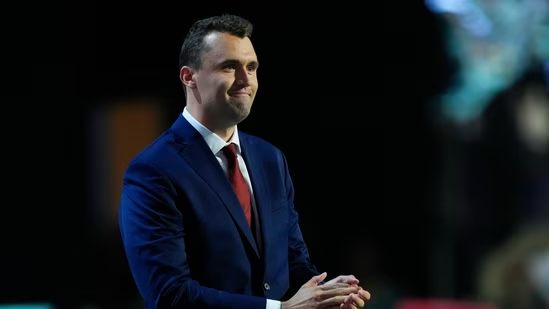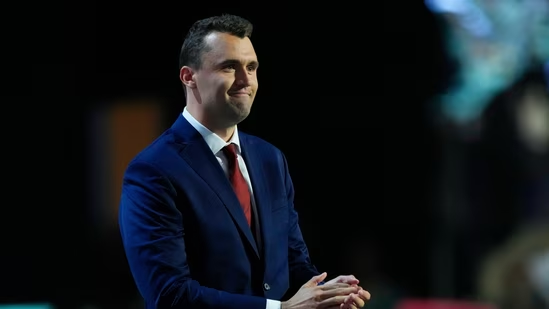
[Order Michael Finch’s new book, A Time to Stand: HERE. Prof. Jason Hill calls it “an aesthetic and political tour de force.”]
I first appeared on Charlie Kirk’s show a few years ago to promote my book What Do White Americans Owe Black People? Racial Justice in the Age of Post-Oppression, which made the moral case against racial reparations. I appeared not as a Republican or Democrat, but first, as a philosopher, and as a political independent. Charlie Kirk was gracious. His explorative and capacious mind comprehended all the nuanced arguments I had made in the book. I had been familiar and impressed with his on-campus debates with students whom he invited to explore a multiplicity of topics, and to exchange in deep and insightful, philosophical give-and-take Socratic dialogues.
Each life, like a book or a piece of literature or film, has a theme that gives it coherence, a narrative structure, and psychological orientation that make it recognizable as a sui generis distinct and invariable phenomenon. When we talk about the theme of a person’s life, we may look at the codified beliefs and actions of that person with a view to seeing if there is a central and consistent pattern that allows us to label it in a distinct manner.
After Charlie Kirk’s death I re-read some of his books and re-examined his interviews and video exchanges with students. I realized that his life was an exceptional one in that it was a highly morally thematized one. A strongly thematized life is one suffused by fundamental principles that manifest themselves into action. Kirk’s life was one lived by strong moral principles that guided and directed his life. They gave moral coherence and psychological continuity over time to his existence in an integrated and comprehensive manner. Regardless of whether one agreed with his ideas or not, one could ostensibly point to his life and categorically identify the universal ideas and fundamental message embodied and conveyed by his life. In that life there was a moral core out of which emerged actions that were constitutive of his personal and moral identity.
When I say that Charlie Kirk lived a morally thematized life, I mean, among other things, that there were no moral contradictions among the moral fundamental first principles that allowed him to live an integrated life where his personal and his moral life were inextricably linked. In the realm of morality, therefore, he lived as a wholesaler, rather than as a retailer, he sought to fight moral battles not piecemeal, but comprehensively—from the core center of his Christian faith without any deviation or contradiction. The linkage between moral and personal identity is glued by what is called the virtues. And to achieve that degree of moral integration one has to have the first cardinal virtue of integrity, which I believe Charlie Kirk possessed.
Against the backdrop of a nihilistic post-modern world that continues to criminalize reason, logic and, therefore, truth; one that elevates moral and cultural relativism to the level of a cult; and one in which temporizing, equivocating, mouthing platitudes and bromides and deceptive sophistries, and in which compromising fundamental moral principles is normalized, mainstreamed and rewarded, Kirk’s life stood out as both an inoculant and effrontery against all that malarkey. For those who lied, engaged in willful self-deception, and sought to elevate their sophomoric high school opinions to the level of human knowledge, Kirk stood for Truth. That was his second virtue which morally thematized his life. He had an almost maniacal drive to pursue the truth. He was not alone in this venture; however, he pursued this moral agenda in a remarkably genius way reminiscent of the philosopher St. Thomas Aquinas. In combining faith and reason, Kirk was an unapologetic Christian man of faith equally committed to the rigors of reason and logic. As one watched him debate students and others over the years, the only tools he ever used to persuade and win arguments were reason, logic and empirical evidence.
I think this is part of the reason he was disliked by many people. Unlike several religious folks who engage in endless question-begging and circular reasoning by simply throwing scripture as definitive, or as the sole evidence for any argument they advance in debates, Kirk held his Christian morals as absolutes, and then used reason and logic with devastating precision to achieve a type of clarity and lucidity in thought to slice through the conceptual confusion and intellectual laziness of many of his challengers—several of whom were more interested in emoting, ranting and venting their vitriol and feelings than in truly engaging in civil and respectful dialogue to arrive at the truth. Kirk listened to them–another virtue that morally characterized his life. His questioners were often rude, vulgar, and plain mean-spirited. Instead of responding in kind, Kirk exercised another set of virtues which helps us to define the moral meaning of who he was: he was gracious and benevolent in his responses to those who sought to insult him.
Kirk was tough, robust and rigorous in his thinking, and he could, at times, come off as formidable and stern. But such is the nature of a man who possessed another virtue that ties the moral meaning of his life into a coherent whole: he embodied the spirit of moral gravitas. This means, to remain faithful to the meaning of the term, that Kirk faced the world with a sense of moral seriousness and sincerity. One could disagree with him on any number of issues, but he had the courage of his convictions. And he died for them. His moral authority and leadership inspired people (even those who disagreed with him) to have the courage to stand firm in their moral convictions, and this all stemmed from his moral gravitas.
Kirk’s moral judgments were not matters of taste or subjective personal opinions; rather, they were principled philosophical viewpoints forged in a crucible of deep ethical contemplation rooted in his Christian faith.
In an era when Gen Z gender wars are reshaping how young people think about marriage and children, Kirk’s life of faith, marriage, and commitment to raising a family are exemplary. At 31 he stood right on the cusp of Gen z and Millennials. Indeed, judging by a recent NBC Decision Desk poll, fewer women seem to be interested in marriage and having children. The Gen Z is the loneliest generation in recorded history, yet paradoxically, it does not, on the whole, recognize marriage and family as being the highest and most fulfilling pursuits. Kirk not only debated young people, he did not demand that they get married. He explained the beauty and virtues of the institution of marriage, and persuaded American youth not to give up on cementing the love they may find in the most sacred institution on earth.
Kirk had become an institution. Some may agree or disagree; it matters not. This article is a tribute to his memory, not a criticism of his ideas. And so, I can think of no fitting way to end this piece than by way of an old school elegy written by Walt Whitman in 1865 upon the death of Abraham Lincoln:
O Captain! My Captain!
O Captain! my Captain! our fearful trip is done,
The ship has weather’d every rack, the prize we sought is won,
The port is near, the bells I hear, the people all exulting,
While follow eyes the steady keel, the vessel grim and daring;
But O heart! heart! heart!
O the bleeding drops of red,
Where on the deck my Captain lies,
Fallen cold and dead.
O Captain! my Captain! rise up and hear the bells;
Rise up—for you the flag is flung—for you the bugle trills,
For you bouquets and ribbon’d wreaths—for you the shores a-crowding,
For you they call, the swaying mass, their eager faces turning;
Here Captain! dear father!
This arm beneath your head!
It is some dream that on the deck,
You’ve fallen cold and dead.
My Captain does not answer, his lips are pale and still,
My father does not feel my arm, he has no pulse nor will,
The ship is anchor’d safe and sound, its voyage closed and done,
From fearful trip the victor ship comes in with object won;
Exult O shores, and ring O bells!
But I with mournful tread,
Walk the deck my Captain lies,
Fallen cold and dead.















